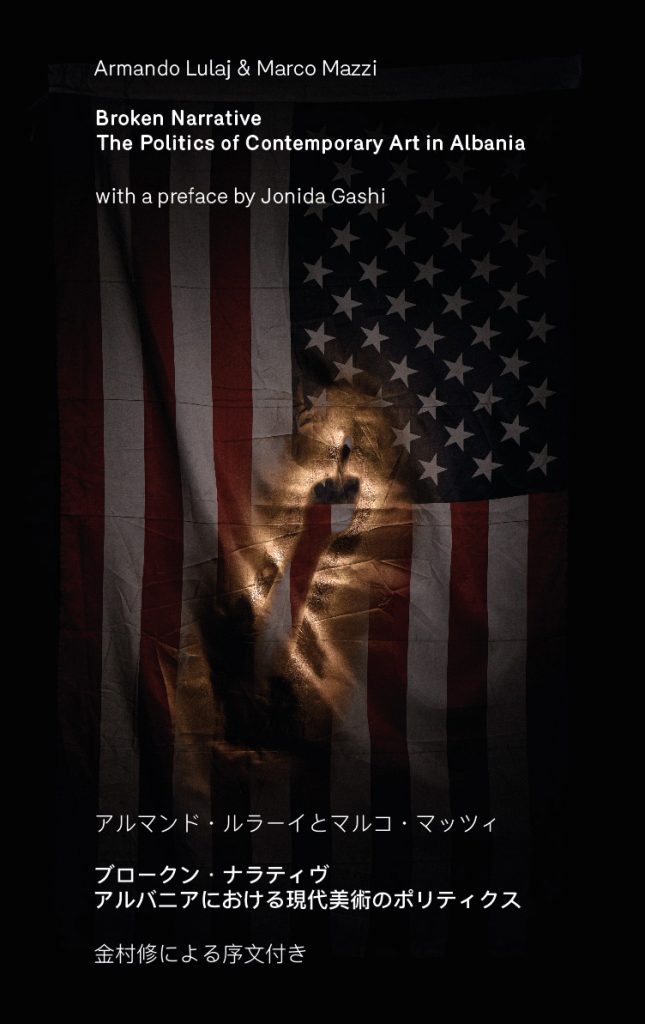
Earth, Milky Way: punctum books, 2022. 364 pages, illus. ISBN-13: 978-1-68571-058-3. DOI: 10.53288/0341.1.00. OPEN-ACCESS e-book and $25.00 in print: paperbound/5 X 8 in.
“Broken Narrative stages a critical intervention in the discourse on the ways contemporary art’s history is intertwined with the rise of global neoliberal capitalism, and it does so while simultaneously offering a sustained and multifaceted look at postsocialist Albania. Lulaj and Mazzi’s dialogue ranges between geopolitics and aesthetics–unpacking the layers of mediation that at once bind together and separate memory, testimony, and history–and providing compelling insights on what it means for artists to act in society.”~ Raino Isto, ARTMargins Online
Broken Narrative provides an extensive reflection on history, politics, and contemporary art, revolving around the cornerstones of the artistic practice of Albanian artist Armando Lulaj. The core of the book is formed by and extended interview of Lulaj by Italian artist and writer Marco Mazzi. This inquiry starts in the year 1997, a year of social and political upheaval in Albania, of anarchy, controversies and emigration, of toxic seeds of neoliberalism sprouting in an already wounded country, and continues to the present day, where politics, hidden behind art forms, has practically destroyed (again) every different and possible future of the country. This book also sketches out a connection between the recent Albanian political context and contemporary art by considering the realities of Albania as essential for an understanding of the dynamics of international power in contemporary art and architecture, and the role of politics therein.
Broken Narrative comes in a bilingual English–Japanese edition, in part as homage to the subtle esthetics of Japanese poetry, which has inspired many of the Lulaj’s works, while equally evoking the subversive films of the Red Army, active in Japan at the turn of the 1960s and ’70s. Broken Narrative contains a double preface in English by Albanian scholar Jonida Gashi and in Japanese by photographer Osamu Kanemura.
About the Authors
Armando Lulaj was born in Tirana in 1980. He is a writer of plays, texts on risk territories, filmmaker, and producer of conflict images. He’s research is orientated towards accentuating the border between economical power, fictional democracy, and social disparity in a global context. His main topics of interest remain power, corruption and institutional critique. Lulaj has participated in many international exhibitions and film festivals. His works are part of various important private and public collections. Armando Lulaj is one of the founders of DebatikCenter of Contemporary Art.
Marco Mazzi (1980) is an Italian photographer and writer living and working between Florence, Tokyo, and Tirana. Mazzi studied Contemporary Literature at the University of Florence and has also studied Japanese avant-garde art and visual poetry in Japan. In 2008, Mazzi founded the non-profit organization Relational Cinema Association within the University of Waseda in Tokyo. Mazzi was photographer-in-residence at The Department of Eagles (Tirana, Albania) during the conference Pedagogies of Disaster and for the project Lapidari, and he was the stage and still photographer for Armando Lulaj’s Recapitulation (2015), commissioned by the 2015 Venice Biennale’ s Albanian Pavilion.

